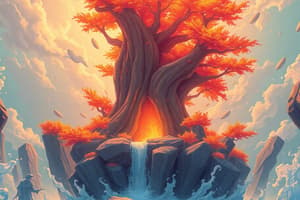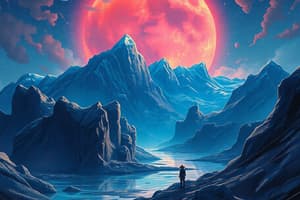Podcast
Questions and Answers
What can be inferred about the image presented?
What can be inferred about the image presented?
- It conveys complex information.
- It offers no visual or textual content. (correct)
- It shows a variety of colors.
- It contains detailed illustrations.
Which statement is most accurate regarding the lack of content in the image?
Which statement is most accurate regarding the lack of content in the image?
- The image includes non-representational art.
- The image is flawless with no errors.
- It is unsuitable for any analytical examination.
- The absence of content could inspire creativity. (correct)
What is a possible reason the image is blank?
What is a possible reason the image is blank?
- It was created as an error in design.
- It is a deliberate artistic choice. (correct)
- It relies on viewers to mentally add content.
- It may have been incorrectly loaded. (correct)
How might the lack of content influence viewer interpretation?
How might the lack of content influence viewer interpretation?
Which of the following best describes the blank state of the image?
Which of the following best describes the blank state of the image?
Стратосфераның озон қабатының негізгі қызметі қандай?
Стратосфераның озон қабатының негізгі қызметі қандай?
Атмосферада қанша қабат бар?
Атмосферада қанша қабат бар?
Мезосфераның биіктігі қандай аралықта орналасқан?
Мезосфераның биіктігі қандай аралықта орналасқан?
Тропосфераның атмосферадағы үлесі қанша?
Тропосфераның атмосферадағы үлесі қанша?
Что из перечисленного не является элементом карты?
Что из перечисленного не является элементом карты?
Какой тип карты наиболее подходит для подробного изучения рельефа местности?
Какой тип карты наиболее подходит для подробного изучения рельефа местности?
Какое из следующих утверждений верно для конических проекций?
Какое из следующих утверждений верно для конических проекций?
Какая технология используется для создания актуальных карт с помощью спутников?
Какая технология используется для создания актуальных карт с помощью спутников?
Кто из следующих ученых сделал значительный вклад в систематизацию карты?
Кто из следующих ученых сделал значительный вклад в систематизацию карты?
Как называются карты, которые специализированы для отображения определенных аспектов, таких как климат или ресурсы?
Как называются карты, которые специализированы для отображения определенных аспектов, таких как климат или ресурсы?
Что представляет собой масштаб карты?
Что представляет собой масштаб карты?
Какое из следующих утверждений о цифровых картах является неверным?
Какое из следующих утверждений о цифровых картах является неверным?
В каком из следующих применений картография не используется?
В каком из следующих применений картография не используется?
Какой из следующих типов карт отображает границы государств?
Какой из следующих типов карт отображает границы государств?
Flashcards are hidden until you start studying
Study Notes
Image Interpretation
- The provided text prompts an analysis of a blank image.
- The lack of visual content invites viewers to engage in interpretation.
- Multiple inferences and interpretations are possible, as the absence of content allows for ambiguity.
Blank State
- The blank state of the image can be perceived as a lack of information, a void, or a blank slate.
- The absence of visual elements encourages viewers to project their own thoughts, experiences, and interpretations.
Viewer Interpretation
- The blank state can be interpreted as a placeholder, suggesting something is missing or yet to be revealed.
- It can also be seen as a symbol of emptiness, potentiality, or even a lack of progress.
Possible Reasons for Blank Image
- The image may be intentionally designed to be blank for artistic or symbolic purposes.
- It could be a placeholder, representing a stage of development, a missing component, or a future update.
- The lack of content might be a result of a technical issue, a delay in content loading, or an error in rendering the image.
Earth's Atmosphere
- The Earth's Atmosphere is comprised of three main layers: the troposphere, stratosphere, and mesosphere.
Troposphere
- The troposphere is the densest layer of the atmosphere and is closest to the Earth's surface.
- It extends up to 12 kilometers in height, encompassing 4/5 of the total atmospheric mass.
- The troposphere is where weather phenomena, like clouds, rain, wind, and storms, occur.
Stratosphere
- The stratosphere is located above the troposphere, extending from 12 kilometers to 80 kilometers in altitude.
- It accounts for approximately 20% of the total atmospheric mass.
- The stratosphere contains the ozone layer, which absorbs most of the Sun's harmful ultraviolet (UV) radiation.
- The ozone layer causes a temperature increase with altitude within the stratosphere.
Mesosphere
- The mesosphere is the middle layer, located between the stratosphere and the ionosphere (the upper layer).
- It spans altitudes between 50 kilometers and 80 kilometers.
- The mesosphere is characterized by decreasing temperatures with increasing altitude.
Cartography Definition
- Cartography is the science of map making, studying methods, principles, and practical aspects of representing geographic objects and phenomena.
Types of Maps
- Topographic maps depict terrain features, roads, bodies of water, and settlements with high detail.
- Political maps display borders of countries and administrative divisions.
- Thematic maps are specialized maps showing specific aspects like climate, population, or resources.
- Navigational maps are designed for sailors and pilots, showing routes and navigation points.
Map Elements
- Coordinate grid is a system for precisely locating objects using latitude and longitude.
- Legend explains symbols and markings used on the map.
- Scale represents the relationship between distances on the map and reality, expressed as a numerical or graphical scale.
Map Projections
- Cylindrical projections represent an area without distortion along latitude, like the Mercator projection.
- Conic projections are better for representing mid-latitudes, with less distortion at the poles.
- Azimuthal projections show the entire earth or a portion centered on a specific point, used for polar regions.
History of Cartography
- Cartography originated with ancient civilizations like the Sumerians, Egyptians, and Greeks.
- It evolved from primitive drawings to modern digital maps.
- Scholars like Ptolemy contributed to the systematization and development of cartographic knowledge.
Modern Technologies
- Geographic Information Systems (GIS) are software for collecting, storing, analyzing, and visualizing spatial data.
- Satellite imagery uses satellites to create up-to-date maps and monitor changes on Earth's surface.
- Digital maps are interactive online maps accessible to users via the internet.
Applications of Cartography
- Navigation, urban planning, ecology, climate studies, and natural resource management.
- Utilized in education, scientific research, military operations, and the tourism industry.
Studying That Suits You
Use AI to generate personalized quizzes and flashcards to suit your learning preferences.




